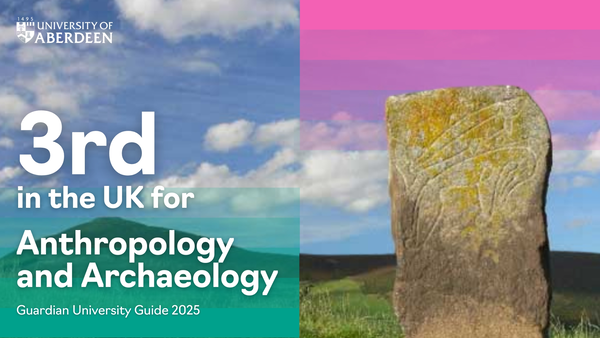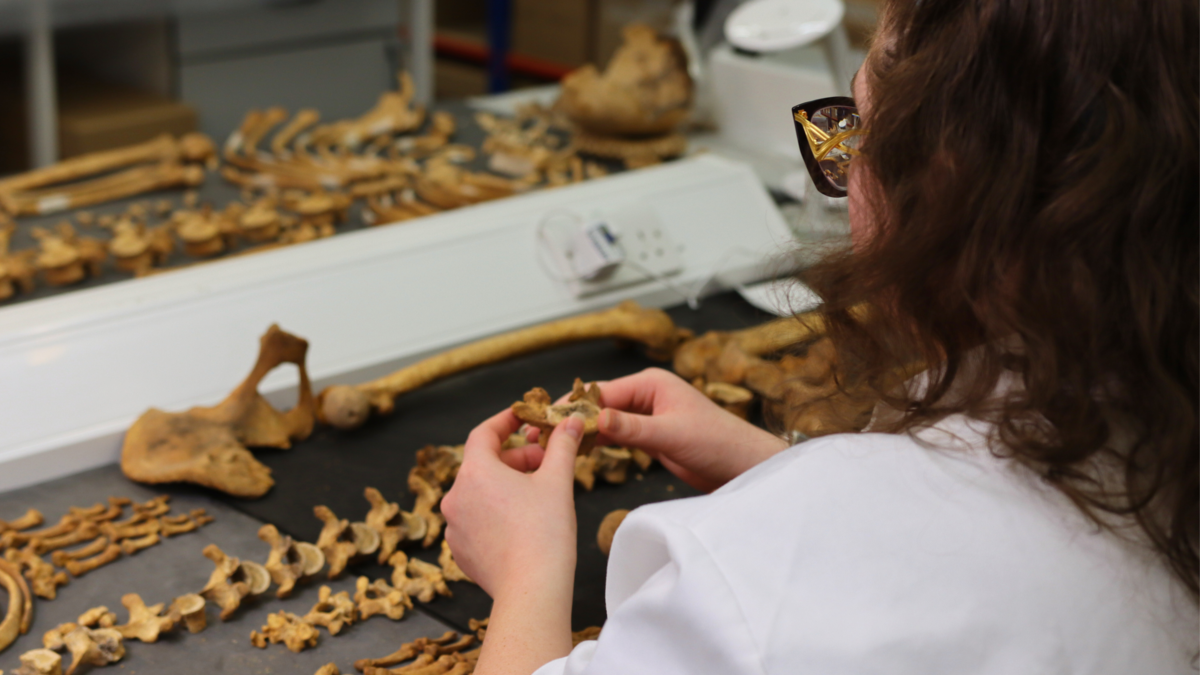
Introduction
This programme uses the unique archaeological collections of the University of Aberdeen, combined with the latest osteoarchaeological approaches and techniques, to provide students with the knowledge and practical skills to analyse human skeletons from archaeological contexts. Apply Now
Did you know? The University of Aberdeen is ranked 3rd in the UK for Anthropology and Archaeology (Guardian University Guide 2025)
Study Information
At a Glance
- Learning Mode
- On Campus Learning
- Degree Qualification
- MSc
- Duration
- 12 months or 24 months
- Study Mode
- Full Time or Part Time
- Start Month
- September

The University of Aberdeen’s Museum Collections hold thousands of human skeletons from research and rescue excavations, including extensive archaeological human skeletal collections from Neolithic to Medieval and post-Medieval remains. In particular the collection has a rich assemblage of material from the major medieval towns of Aberdeen, Perth, and St Andrews, as well as prehistoric material from Neolithic and Bronze Age periods.
These collections provide unparalleled research and teaching opportunities for students at the University of Aberdeen. Students will actively work on these extensive and nationally significant collections and where possible, publish the results as part of student/staff projects. As part of the programme, students also have the option to take advanced modules in funerary archaeology and ancient biomolecules (aDNA, isotopes, proteins and lipids).
This programme in the developing field of Human Osteoarchaeology (the study of human remains) will provide the knowledge and practical skills to unlock the rich stories of the human past, equipping students with the knowledge to understand some of the major trends in the development of human lifeways and societies.
What You'll Study
Compulsory Courses
Optional Courses
Select ONE from the following:
We will endeavour to make all course options available. However, these may be subject to change - see our Student Terms and Conditions page.
| Fee category | Cost |
|---|---|
| EU / International students | £22,000 |
| Tuition Fees for 2025/26 Academic Year | |
| Self-funded international students commencing eligible postgraduate programmes in 2025/26 will receive a £8,000 tuition waiver - See full terms and conditions | |
| UK | £10,000 |
| Tuition Fees for 2024/25 Academic Year | |
Fee Information
Additional Fee Information
- In exceptional circumstances there may be additional fees associated with specialist courses, for example field trips. Any additional fees for a course can be found in our Catalogue of Courses.
- For more information about tuition fees for this programme, including payment plans and our refund policy, please visit our Tuition Fees page.
Scholarships
All eligible self-funded international Postgraduate Masters students starting in September 2025 will receive an £8,000 scholarship. Learn more about this Aberdeen Global Scholarship here.
To see our full range of scholarships, visit our Funding Database.
How You'll Study
Learning Methods
- Field Trips
- Field Work
- Group Projects
- Individual Projects
- Lectures
- Tutorials
Assessment Methods
Classes are taught through lectures, small group tutorials and seminars. A main focus of the MSc is development of individual research skills through dissertation work.
Assessment for each 30-credit taught module is on the basis of one 3000-word essay and one 3000-word project on topics relevant to the course. The nature of the project may vary from course to course and include reports, exercises and oral presentations.
Why Study Osteoarchaeology?
- Study at an internationally renowned university for Archaeology. The University of Aberdeen is ranked 3rd in the UK for Anthropology and Archaeology (Guardian University Guide 2025) and in the Global Top 100 for Archaeology (QS World University Rankings by Subject 2024)
- Aberdeen is ranked 1st in Scotland for Overall Student Satisfaction in Forensic and Archaeological Sciences (National Student Survey 2024)
- Archaeological research at Aberdeen spans the arts and humanities, physical and biological sciences, reflecting the interdisciplinary nature of the Archaeology and the collaborative ethos within the University
- Geographically, the University of Aberdeen is an excellent location to study archaeology due to the vast number of archaeologically significant locations in Aberdeenshire, and the Highlands and Islands. Aberdeen is just a ferry ride away from UNESCO World Heritage Sites on Orkney and Shetland
- You will be taught by a dedicated team of Archaeologists with a broad range of expertise and teaching experience, and will benefit from hands on access to the University’s unrivalled collection of human skeletons
- Student numbers on the programme are small enough to allow for a strong level of teaching interaction and relationship building amongst students
- This programme benefits from significant input from other related research being carried out at Aberdeen into human remains, including multi-isotopic analyses, the Alaska project, and cemetery studies and human remains research in the Northern Picts project
- The University of Aberdeen Department of Archaeology, in partnership with the village corporation Qanirtuuq, Inc. and the Yup’ik village of Quinhagak, Alaska, is working to record archaeological sites threatened by rising sea levels along the Bering Sea. This is something you could volunteer to be part of
Entry Requirements
Qualifications
The information below is provided as a guide only and does not guarantee entry to the University of Aberdeen.
2:1 (upper second class) UK Honours degree, or an Honours degree from a non-UK institution which is judged by the University to be of equivalent worth in Archaeology, Anthropology or a related discipline.
2:2 in Archaeology or related discipline plus related professional experience.
Please enter your country or territory to view relevant entry requirements.
English Language Requirements
To study for a Postgraduate Taught degree at the University of Aberdeen it is essential that you can speak, understand, read, and write English fluently. The minimum requirements for this degree are as follows:
IELTS Academic:
OVERALL - 6.5 with: Listening - 5.5; Reading - 5.5; Speaking - 5.5; Writing - 6.0
TOEFL iBT:
OVERALL - 90 with: Listening - 17; Reading - 18; Speaking - 20; Writing - 21
PTE Academic:
OVERALL - 62 with: Listening - 59; Reading - 59; Speaking - 59; Writing - 59
Cambridge English B2 First, C1 Advanced, C2 Proficiency:
OVERALL - 176 with: Listening - 162; Reading - 162; Speaking - 162; Writing - 169
Read more about specific English Language requirements here.
Document Requirements
You will be required to supply the following documentation with your application as proof you meet the entry requirements of this degree programme. If you have not yet completed your current programme of study, then you can still apply and you can provide your Degree Certificate at a later date.
- CV
- an up-to-date CV/Resumé
- Degree Certificate
- a degree certificate showing your qualifications
- Degree Transcript
- a full transcript showing all the subjects you studied and the marks you have achieved in your degree(s) (original & official English translation)
- Personal Statement
- a detailed personal statement explaining your motivation for this particular programme
Aberdeen Global Scholarship
Eligible self-funded Postgraduate Taught (PGT) students will receive the Aberdeen Global Scholarship. Eligibility details and further information are available on our dedicated page.
Aberdeen Global ScholarshipCareers
An Archaeology degree can be the gateway to many other professions, and the training in analytical and communication skills acquired by our graduates make them employable in a wide variety of fields including industry, commerce and research.
The broad-based nature of the discipline enables graduates to compete strongly in the employment market place. Today Archaeologists in the UK work in an increasingly wide range of professions. A significant percentage of graduates are employed in private or university-based archaeological units and consultancies. These professionals are responsible for mitigating the impact to archaeological sites in relation to different forms of development. Typically, such posts involve a good deal of fieldwork and the production of high quality scientific reports.
Others graduates go on to research, teaching and curatorial posts in universities, museums and private institutions and work in a range of areas from interpreting ancient environments to communicating archaeology to the public. In addition to more traditional occupations, a growing number of Archaeologists are now employed by a range of governmental and non-governmental heritage organizations.
Careers in this area are primarily involved in making decisions about the management and conservation of archaeological resources at local, national and international levels. Archaeologists and individuals with archaeological training also work in a growing number of non-traditional careers where archaeological knowledge is central. These positions range widely, from jobs with engineering firms, where knowledge of archaeological principals can be crucial to project planning, to careers which engage the public's appreciation of the past.
What our Alumni Say
Our Experts
- Programme Coordinator
- Dr Rebecca Crozier
- Other Experts
- Professor Kate Britton
- Dr Linus Girdland
Information About Staff Changes
You will be taught by a range of experts including professors, lecturers, teaching fellows and postgraduate tutors. However, these may be subject to change - see our Student Terms and Conditions page.
Facilities
King's Museum
King’s Museum lies at the heart of the University's Old Aberdeen campus. As well as being Scotland's newest museum, it may also be the oldest as its origins lie in a museum collection established in King's College in 1727.

Department Research
Archaeological research at Aberdeen spans the the arts and humanities, physical and biological sciences, reflecting the interdisciplinary nature of the Archaeology and the collaborative ethos within the University.
Get in Touch
Contact Details
- Address
-
Student Recruitment & Admissions
University of Aberdeen
University Office
Regent Walk
Aberdeen
AB24 3FX


